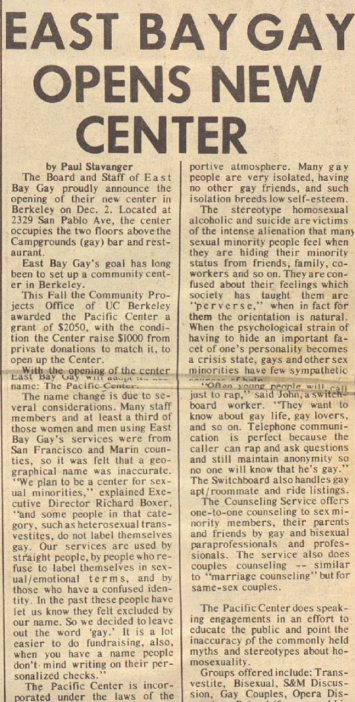A momentous occasion: on December 2, 1974, East Bay Gay opened a new center on San Pablo Avenue, called “Pacific Center.” Previously, the center had been run out of co-founder Jim Green’s living room and then out of Bishop’s Coffeehouse; this was their first real brick-and-mortar space, allowing them to expand their services. It was for this location that Lenn Keller, inspired by its location above the gay bar and restaurant Campgrounds, began booking lesbians of color to perform on the stage downstairs.
The Barb‘s coverage also suggests an important facet of the new center: though it grew out of East Bay Gay, it was not exclusively oriented to those who understood themselves as “gay”.
Richard Boxer, Executive Director of East Bay Gay, explained that the new name reflected the broad group of people that the center hoped to serve, many of whom might understand themselves as “sexual minorities,” which was a broader category than “gay”. The category of sexual minorities encompassed those, “such as heterosexual transvestites,” who “do not label themselves as gay,” he said. But Pacific Center existed to serve even those who were uncomfortable with such labels. “Our services are used,” Boxer said, “by straight people, by people who refuse to label themselves in sexual/emotional terms, and by those who have a confused identity.”
“In the past,” Boxer added, “these people have let us know they felt excluded by our name. So we decided to leave out the word ‘gay’.”
There was also a practical element to the name change, Boxer admitted. “It is a lot easier to do fundraising, also,” he said, referring to the deep stigma attached to the word ‘gay’ in the 1970s, “when you have a name people don’t mind writing on their personalized checks.”
The article debunks a myth that circulated around Pacific Center — that its name derived from the IRS’s unwillingness to issue the organization their 501(c)(3) status. But it underscores an element of truth in the myth: fundraising for the center was no easy task in the 1970s, and the Center had to strategize on how to handle, in its basic operations, the larger hostility to queer communities.
The article also documents the range of support groups that Pacific Center offered in its early days: “Transvestite, Bisexual, S&M Discussion, Gay Couples, Opera Discussion, Primal (for gay and bisexual people involved with Primal Therapy), Married Men, and a general gay contact rap.”
